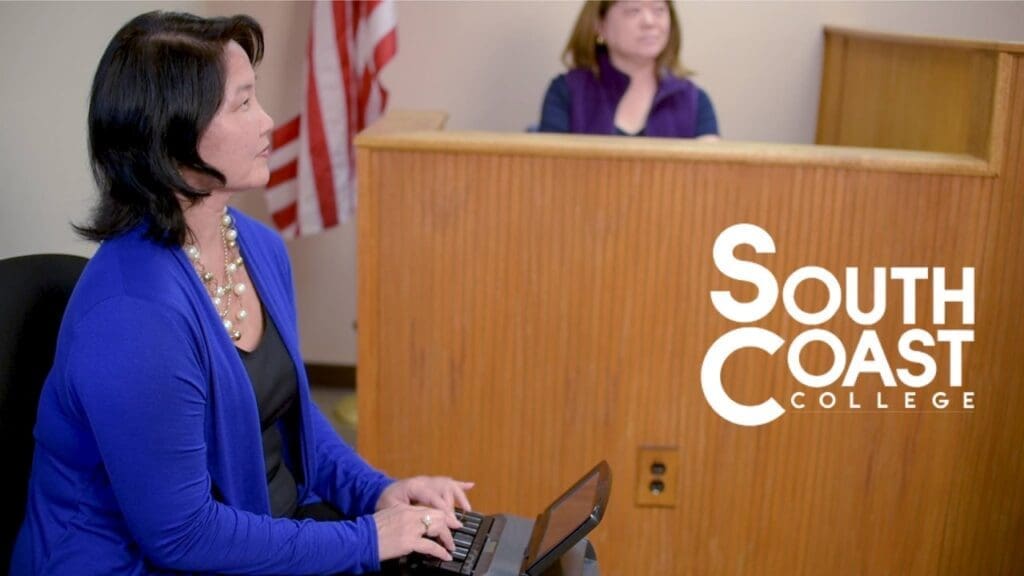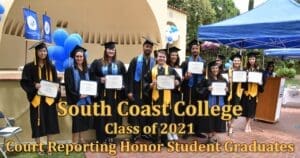Los Angeles Superior Court (LASC) representatives have visited our online campus three times in the last two months to inform students of the benefits of being employed as a court reporter for LASC and the Honorable Judge Bobbi Tillmon, LASC, recently appeared on the South Coast College Legal Networking Forum reiterating the pressing need for court reporters.
Blanca Carvajal, CSR, a veteran court reporter who is now a managing reporter, and a more recent reporter, Jesse Picklesimer, CSR, who was hired in 2018, were the latest speakers.
Having not been present at the previous sessions, I was impressed by the detail in which the two reporters described all parts of the items on the Job Opportunity flyer that can be downloaded from the website.
I thought you might be interested in the following information.
The managing reporter first explained the salary at which a new reporter would be hired. She explained that the salary range for a new reporter based on the range on the flyer would be $96,000 a year. She also explained something that I had not known before. I assumed that transcript fees were additional salary. She explained that the court reporter is also an independent contractor who conservatively earns $25,000-$30,000 in transcript fees with the ability to use the tax benefits of being an independent contractor to write off expenses.
In addition, she detailed the extensive medical, dental, and retirement benefits.
At the end of the session, she mentioned that LASC had just hired another of our graduates. Later that evening, I found out that LASC had hired another three of our graduates.
Ms. Carvajal also indicated that anyone who passes the Certified Shorthand Reporter (CSR) Examination is encouraged to apply for a job rather than going to work as an independent contractor doing depositions because LASC has implemented an extensive three-week training and shadowing program.
Previously, LASC required deposition reporting experience before it would hire a newly licensed CSR. Ms. Carvajal went on to indicate that deposition experience really does not help because the requisite skill sets do not transfer. Moreover, deposition experience gives you more experience in civil than in criminal law procedures. In court, all criminal litigation requires a court reporter whereas not all civil litigation requires a court reporter.
Everyone at South Coast College was happy to learn–as Ms. Carvajal indicated would be the case–that the three newest CSRs who applied at LASC were offered a position:
Madeline Donner, CSR—a first-time candidate who was the only first-time candidate in the state to pass the last CSR test.
Joy Wada, CSR—a 20-year-old who completed the program in 2 years and as a first-time candidate passed the prior CSR examination.
Megan Ordona, CSR—a graduate of both South Coast College and UC Irvine and as a first-time candidate passed the prior CSR examination.
While the demand for court reporters is reaching epic proportions, what is being done to alleviate this demand?
The National Court Reporters Association (NCRA) realized the consequences of not acting and allowing court reporting to disappear. NCRA has a rigorous licensing examination called the Registered Professional Reporter (RPR) Examination that has been adopted by many states. Twelve states have their own in-state certification (one of which accepts either RPR certification or its state-specific certification). Eighteen states have no licensing requirements.
Out of all these state examinations, the California Certified Shorthand Reporters (CSR) Examination has the reputation of being the most rigorous.
It is important to understand the differences in the certification requirements. The RPR Examination is composed of three tests at speeds of 180 wpm (one-voice literary material), 200 wpm (two-voice testimony), and 225 wpm (one-voice jury charge). While the CSR Examination consists of one test, the RPR consists of three tests that do not have to be taken at the same time. An RPR candidate can take and pass one leg of the test at a time.
To understand the significance of the main differences in the two tests, you must take into consideration the length of the testing period and the required accuracy.
All three tests of the RPR are five minutes in length. The California CSR is 10 minutes in length. The required accuracy for the RPR is 95 percent. The required accuracy for the CSR is 97.5 percent.
What does that difference in time and required accuracy translate to in terms of errors? A candidate taking the RPR 200 wpm 5-minute testimony test can make 50 errors and pass a test that consists of two speakers. To pass the 200 CSR testimony test, a candidate must take a 10-minute test and can make only 50 errors to pass a test that consists of 4 speakers.
CSR 200 Testimony Test RPR 200 Testimony Test
No of speakers: 4 No. of speakers: 2
Length: 10 minutes Length: 5 minutes
Required Accuracy: 97. 5 Required Accuracy: 95
Errors allowed: 50 Errors allowed: 50
The 200 wpm CSR Testimony Test Versus the 200 wpm RPR Testimony Test
Well, you might say, “But the RPR requirement is three tests including a Jury Charge at 225 wpm.” A candidate who sat for the last CSR test had passed both the 225 wpm and 200 wpm legs of the RPR and did not pass the last CSR examination. Of course, there was only one CSR candidate who did pass – Madeline Donner, CSR, mentioned in the previous section who was immediately hired by LA Superior Court.
Fortunately, it is thanks to NCRA for its foresight in addressing the shortage of court reporters nationwide by providing what has turned out to be a solution for many students in California. The NCRA created a test to allow new reporters to be certified to work upon passing the Registered Skilled Reporter (RSR)—a test that reduces the requirements for the certification to allow more student-entry into the field. It was created as a stepping-stone credential to achieving the RPR designation. The RSR (Registered Skilled Reporter) certification offers the prestige of an NCRA certification for those new or returning to the court reporting profession who have yet to be able to get their writing speeds enough to earn the RPR. Now, that same candidate mentioned previously who did not pass the California CSR can work in entry-level reporting in Washington State and other states that recognize this certification.
With the popularity of online remote depositions outside of California and demand for court reporters in other areas than legal, more new reporters who have not passed the CSR can still find plenty of work without passing any certification. Graduates who are awaiting passing the CSR readily are being hired to work documenting podcasts, producing police reports, and documenting patient interviews. The Los Angeles Police Department recently announced that it is hiring court reporters. In addition, a whole range of opportunities exist even for students at various stages of their skill development while they are in school.



